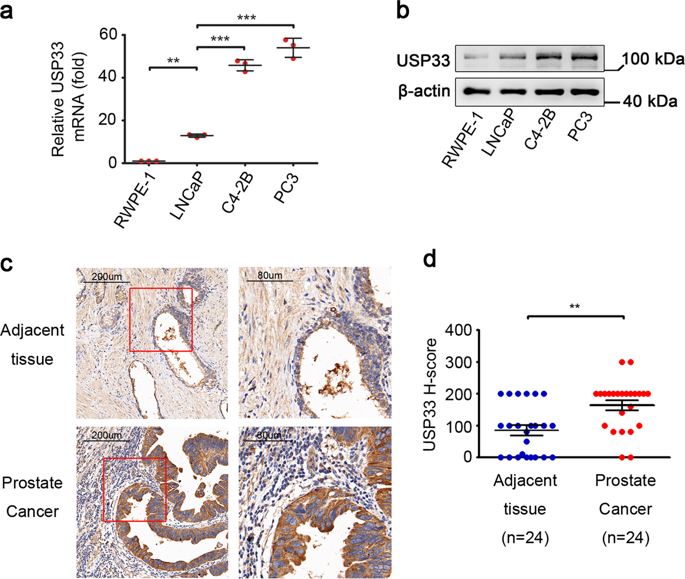当前位置:
X-MOL 学术
›
Cell Death Differ.
›
论文详情
Our official English website, www.x-mol.net, welcomes your feedback! (Note: you will need to create a separate account there.)
Deubiquitinating enzyme USP33 restrains docetaxel-induced apoptosis via stabilising the phosphatase DUSP1 in prostate cancer.
Cell Death and Differentiation ( IF 12.4 ) Pub Date : 2019-12-19 , DOI: 10.1038/s41418-019-0473-8 Fei Guo 1 , Chao Zhang 1 , Fubo Wang 1 , Wei Zhang 1 , Xiaolei Shi 1 , Yasheng Zhu 1 , Ziyu Fang 1 , Bo Yang 1 , Yinghao Sun 1
Cell Death and Differentiation ( IF 12.4 ) Pub Date : 2019-12-19 , DOI: 10.1038/s41418-019-0473-8 Fei Guo 1 , Chao Zhang 1 , Fubo Wang 1 , Wei Zhang 1 , Xiaolei Shi 1 , Yasheng Zhu 1 , Ziyu Fang 1 , Bo Yang 1 , Yinghao Sun 1
Affiliation

|
The treatment of castration-resistant prostate cancer (CRPC) still faces many challenges. Docetaxel is a chemotherapeutic drug commonly used in CRPC patients. However, docetaxel-based chemotherapy usually causes docetaxel resistance, partially due to the resistance of CRPC cells to docetaxel-induced apoptosis. Here, we report that the deubiquitinating enzyme ubiquitin-specific protease 33 (USP33) inhibits docetaxel-induced apoptosis of prostate cancer cells, including androgen-independent prostate cancer cells. USP33 is overexpressed in prostate cancer cells and tissues. We found that knockdown or knockout of USP33 enhanced docetaxel-induced apoptosis of prostate cancer cells, accompanied by increased phosphorylation of the cJUN NH2-terminal kinase (JNK). After blocking docetaxel-induced JNK activation using the JNK inhibitor SP600125 or siRNA targeting JNK, the USP33 knockout-enhanced apoptosis was reversed. Furthermore, we found that USP33 could interact with the phosphatase DUSP1 to negatively regulate the activation of JNK, while USP33 knockdown promoted the proteasomal degradation of DUSP1. Mechanistically, we found that USP33 could inhibit the Lys48 (K48)-linked polyubiquitination of DUSP1. More importantly, DUSP1 overexpression could reverse the USP33 knockdown-induced JNK activation and apoptosis in docetaxel-treated prostate cancer cells. Therefore, USP33 overexpression in prostate cancer may contribute to docetaxel resistance by inhibiting the degradation of its partner DUSP1, leading to impaired JNK activation and apoptosis. Our study suggests that USP33-DUSP1-JNK may be a key signalling module mediating the docetaxel resistance of CRPC, indicating that USP33 is a potential novel therapeutic target in CRPC.
中文翻译:

去泛素化酶 USP33 通过稳定前列腺癌中的磷酸酶 DUSP1 来抑制多西紫杉醇诱导的细胞凋亡。
去势抵抗性前列腺癌(CRPC)的治疗仍然面临许多挑战。多西他赛是一种常用于 CRPC 患者的化疗药物。然而,基于多西紫杉醇的化疗通常会导致多西紫杉醇耐药,部分原因是 CRPC 细胞对多西紫杉醇诱导的细胞凋亡具有耐药性。在这里,我们报告了去泛素化酶泛素特异性蛋白酶 33 (USP33) 抑制多西紫杉醇诱导的前列腺癌细胞凋亡,包括不依赖雄激素的前列腺癌细胞。USP33 在前列腺癌细胞和组织中过度表达。我们发现敲除或敲除 USP33 增强了多西他赛诱导的前列腺癌细胞凋亡,同时增加了 cJUN NH2 末端激酶 (JNK) 的磷酸化。使用 JNK 抑制剂 SP600125 或靶向 JNK 的 siRNA 阻断多西紫杉醇诱导的 JNK 激活后,USP33 敲除增强的细胞凋亡被逆转。此外,我们发现 USP33 可以与磷酸酶 DUSP1 相互作用以负调节 JNK 的激活,而 USP33 敲低促进了 DUSP1 的蛋白酶体降解。从机制上讲,我们发现 USP33 可以抑制 DUSP1 的 Lys48 (K48) 连接的多泛素化。更重要的是,DUSP1 过表达可以逆转 USP33 敲低诱导的 JNK 激活和多西紫杉醇处理的前列腺癌细胞凋亡。因此,USP33 在前列腺癌中的过度表达可能通过抑制其伙伴 DUSP1 的降解,导致 JNK 活化和细胞凋亡受损,从而导致多西紫杉醇耐药。
更新日期:2019-12-19
中文翻译:

去泛素化酶 USP33 通过稳定前列腺癌中的磷酸酶 DUSP1 来抑制多西紫杉醇诱导的细胞凋亡。
去势抵抗性前列腺癌(CRPC)的治疗仍然面临许多挑战。多西他赛是一种常用于 CRPC 患者的化疗药物。然而,基于多西紫杉醇的化疗通常会导致多西紫杉醇耐药,部分原因是 CRPC 细胞对多西紫杉醇诱导的细胞凋亡具有耐药性。在这里,我们报告了去泛素化酶泛素特异性蛋白酶 33 (USP33) 抑制多西紫杉醇诱导的前列腺癌细胞凋亡,包括不依赖雄激素的前列腺癌细胞。USP33 在前列腺癌细胞和组织中过度表达。我们发现敲除或敲除 USP33 增强了多西他赛诱导的前列腺癌细胞凋亡,同时增加了 cJUN NH2 末端激酶 (JNK) 的磷酸化。使用 JNK 抑制剂 SP600125 或靶向 JNK 的 siRNA 阻断多西紫杉醇诱导的 JNK 激活后,USP33 敲除增强的细胞凋亡被逆转。此外,我们发现 USP33 可以与磷酸酶 DUSP1 相互作用以负调节 JNK 的激活,而 USP33 敲低促进了 DUSP1 的蛋白酶体降解。从机制上讲,我们发现 USP33 可以抑制 DUSP1 的 Lys48 (K48) 连接的多泛素化。更重要的是,DUSP1 过表达可以逆转 USP33 敲低诱导的 JNK 激活和多西紫杉醇处理的前列腺癌细胞凋亡。因此,USP33 在前列腺癌中的过度表达可能通过抑制其伙伴 DUSP1 的降解,导致 JNK 活化和细胞凋亡受损,从而导致多西紫杉醇耐药。


























 京公网安备 11010802027423号
京公网安备 11010802027423号